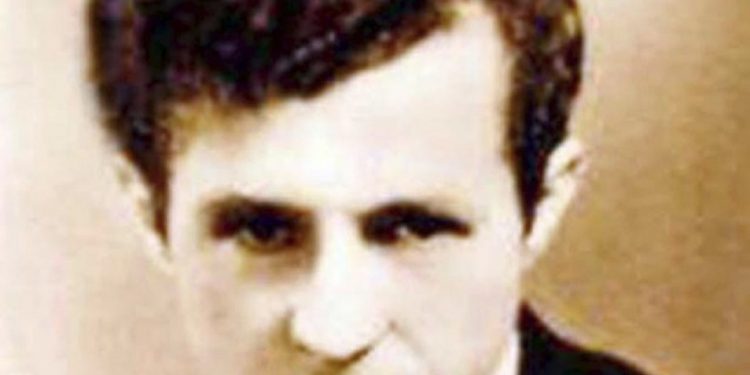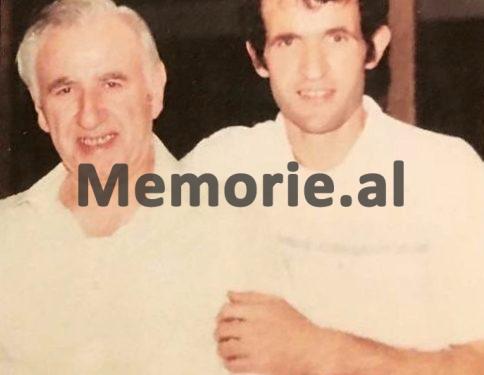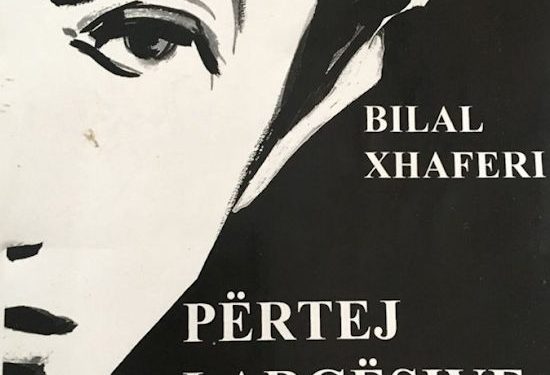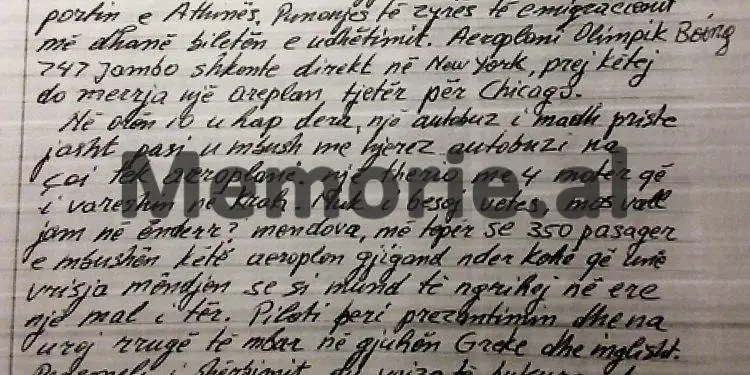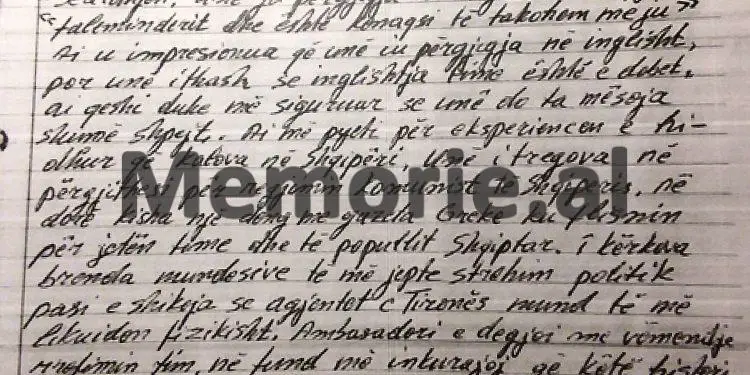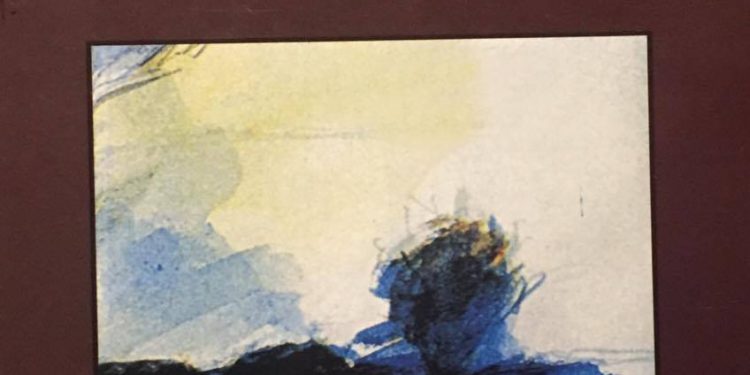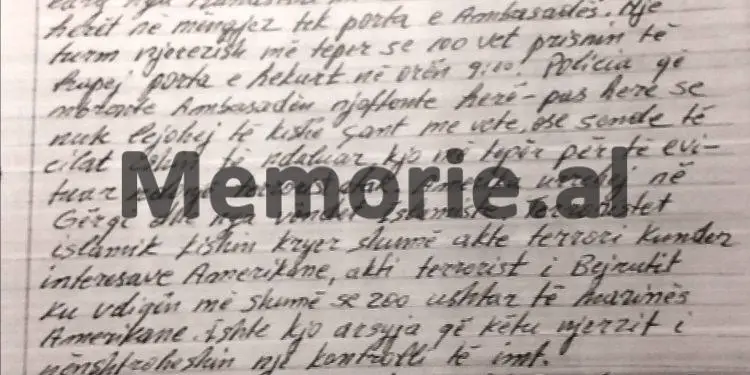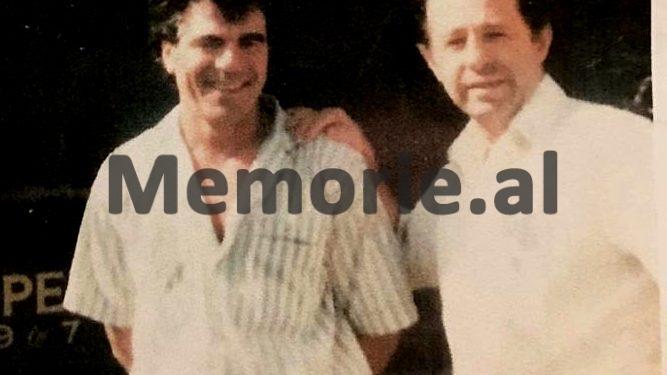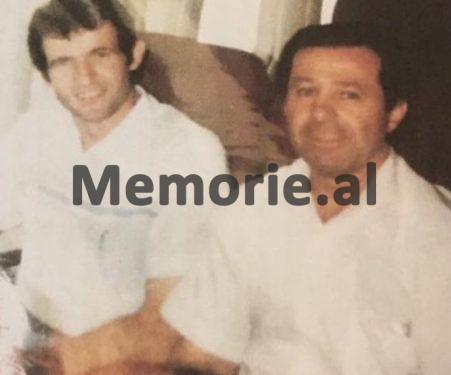Dashnor Kaloçi
Part twenty-two
Memorie.al publishes some parts of the voluminous autobiographical book in manuscript “Beautiful land, ugly people” (memories from hell) by the author, Kasem Hoxha, originally from the village of Markat in Saranda and living in the USA since 1985, when he fled Albania after suffering ten years in the prisons of Enver Hoxha’s communist regime. The whole sad and painful story of Kaso Hoxha, from the life and hard work in his village in the southernmost part of the country, the dissatisfaction with the regime and the first poems of a political nature, how they fell into the hands of the State Security and who were his relatives who spied on him, the arrest in the office of the Chairman of the People’s Council of Markat village, by the State Security on June 21, 1973, the investigation in the Saranda Branch of Internal Affairs, the trial against him and the sentence with 10 years in prison for “agitation and propaganda”, staying in “Kaushin” of Tirana (Ward 313), and the prisoners he found there, being sent to Spaç and working in that camp with criminal and “soft” police officers, the accomplices of description of their “portraits” with positive and negative sides, release from prison and return to the countryside, escape to Greece and stay in the Lavros camp, gaining political asylum in the USA, correspondence with Amnesty International, e London branch, inf information with the data he sent to the prisoners of Spaç and the communist regime in Albania, to the creation of a new family and life and work in that distant place with the Cham community divided by the intrigues of the people of the State Security from Albania operating there.
Excerpts from the manuscript book, “Beautiful land, ugly people“, (memories from hell) of the author, Kasem Hoxha, sent by him exclusively for Memorie.al
Prologue
Dear readers!
Do not pay attention to the title I am presenting to you, I mean, if you are not patient to read this collection of memoirs, if you want to forgive the author, that his style is pale, uninspired before this drama of great, of my people, of my martyred nation.
My characters are not created by my imagination, but are real people, they are your brothers, your fathers, your relatives. The events are not fictional, but real and lived. You will convince yourself, only after reading this summary with memories. You will find something from your life, something real from the lives of your fathers, your mothers, your brothers, how they suffered and how they died.
I wrote this collection of memories about the legacy left to me by my friends, for the world to learn the truth, how innocent people were tortured, how they suffered, how they died, in the camps and prisons of the executioner, Enver Hoxha!
I go with the hope that any reader, Albanian or foreign, is not left with hatred, from criticism, beating opposing opinions, as it is the best way to find the truth. The title of the book, “Beautiful land, ugly people”, will anger the reader, but in the end, I will conclude that I have the right to call it “The 45-year era of the satanic communist regime of Enver Hoxha”: Ugly.
I, alas, for the misfortune I had, saw and lived the great drama that happened before my eyes. I am neither a poet nor a orator, I will need hard work to escape the literary mistakes in this historical book, which can inspire future poets and writers, on the tragedy of our time, of the darkest time of my nation !
Ladies and Gentlemen, I wish you all freedom and peace…!
Kaso Hoxha.
Llavrio, Greece 1985
Continued from the previous issue
My meeting with Bilal Xhaferri after 15 years!
It was November 6, 1985. One week while living in America, I asked my cousin, Rexhep Hoxha, if he could find me a job. My wish was to go to school, he enrolled me in Truman College. Rexhepi’s son, Abdullaj, listened to our conversation that I was interested in working and he got in touch with more construction work, which I also liked to do. Told me if I wanted to help her the next day, after I finished school to dismantle some signs in a 3-4 storey building?
I accepted, so we did, we left at 2 o’clock in the afternoon and started working. It was raining hard and cold, however I started work even though my nephew, Abdullah, begged me to leave it for another day. “No,” I said, “it will end today.” After more than two hours of work I was almost in the last screws when I heard someone talking to me down the street! I turned my head to see who was the one who spoke Albanian to me! Although more than 15 years had passed, I knew him by heart.
It was Bilal Xhaferi, the only fellow villager I had not met, as he did not appear at all the dinners hosted by my relatives! Anyone who asked, “Where is Bilal and how is he doing?” The answer was cold, simply: “We do not know anything”!
When I heard that voice I did not jump from the ladder. I hurried downstairs and hugged my hero as he told me:
– “Do not think that I did not shake my head about your arrival, believe me, I received the news of your arrival from Skënder two days ago. Today I went to Rexhepi’s house. “Difua gave me the address where you worked, and here I am, brother Kaso.”
– “Thank you Bilal, I do not know how to express the pleasure that you took the trouble to come to meet me, I have so much to show, I believe that one day we will sit down to have a coffee together”, I returned to Bilal shaking his hand.
“Yes, yes, I came for that, I want to know what time you are free to talk, I have so many questions”, continued Bilali.
– “From Monday to Friday from 9:00 in the morning until 14:00 I am at school, in the afternoon, if I find a job, I work. “I am free on Saturdays and Sundays,” I replied.
– Then on Saturday morning at 9:00 you can come to the corner of Western Ave and Lawrence Ave, there is a cafe called: “Hollywood”, Bilali asked me.
“Despite the fun,” I replied.
“Then if I let you finish work, we will see you on Saturday at 9:00, good night”, said Bilali and left.
Selfos and Rexhepi were not happy that I would meet Bilal!
I told Selfos that next Saturday I will meet Bilal, he invited me for coffee. Selfos and Rexhepi did not feel well?! I knew, as Selfua did not speak to Bilal and I had heard full gossip from all my relatives. Selfos confessions had shocked me and now I wanted to hear the other side, that of Bilal. As far as I understood, the culprit was Selfua himself, who surrendered to Tirana agents.
I looked forward to Saturday. When I got to the restaurant it was not yet 9:00 in the morning, I went inside and asked the waiter to give me a table if possible, in a corner, for two people. Surprisingly Bilal was there before me and told me to go to his desk. We had breakfast together and I answered all the questions that Bilal asked me, giving him a long information about the situation in Albania. After telling him my entire odyssey through the prisons of the communist regime, I told him I knew what was going on in Chicago, according to the agent, K. K.
Bilal was stunned by everything I told him and was convinced that I was not a spy. Bilal told me as a brother-in-law and he told me with his mouth that: because of all the enmity between Albanians, it was the work of agents and spies of Tirana. When he said to me: “Selfua is your cousin, but he is also my brother-in-law, I am sorry to say that he is, my enemy, we have not spoken for years and I do not want to ever see him with my own eyes, just to tell you one thing: be careful, you have suffered a lot in your life, you need to relax ”!
We left to meet again the next day at the same hour, and since that meeting, we have met every Saturday and Sunday. Bilal worked in a collection warehouse for recycling materials. “He told me that he had no house and that he slept in a warehouse shack, because the owner was a good Jew,” Bilali said.
After I left Chicago, Bilal came several times to visit me in Aurora, a small town, 150 km. away from Chicago. Bilali promised me that he would publish the collection of memoirs piece by piece in the magazine “Krahu Shqiponjës”.
The phone call that Bilal made to me that he was hospitalized!
But disaster struck, the bitter news from Bilal’s own mouth! It was the second week of October 1986, in the morning I had just started work, when the owner of the restaurant, Stefan Hajazi, told me:
“Someone will talk to you.”
– “Hello who is it”? I answer!
– “I am Bilal, Kaso”!
– “Good morning Bilal, how are you?”
“I’m not well, Kaso, I’m in the hospital,” he replied
-“What”? the pieta shocked.
“Kaso is sick, the tests they did show that I have a tumor on my head,” he told me in a low voice.
– “In which hospital are you Bilal? I will come as soon as possible”!
– “I’m in Masonic 836 Ë Wellington Ave Hospital”, do not try to come, because I will enter the operating room and you will not be able to see me. Come better tomorrow “, Bilali advised me.
I called all my villagers who were there, if they knew anything about Bilal’s health. Bilal also introduced Skënder Shuaipi, the only man they talked to. I went to the hospital the next day with Rexhep Hoxha. In Bilal’s room we found Skënder Shuaip with his wife and mother. Bilal was still in a “coma”, he did not understand anything about what was happening around him, where the nurses looked at the equipment from time to time.
His head was wrapped in a bandage and only part of his face was exposed! We asked the doctor when he could be mentioned by that deep sleep? He told us: “I believe after 24 hours I can speak”. We left and left to come the next morning. We found Bilal awake that morning October 15th. Bilal recognized us and your eyes filled with tears. Taking her hand that was so cold, I tell her:
Bilal said to me: “Kaso, this is my end”!
-” Past Bilal, courage. You are strong, you will overcome this evil too”!
– “No Kaso, the prognosis is not good, I am paralyzed half of the body, I have no feelings. As far as I can see, this is my end”!
-“No no! “Never think of him, courage Bilal”, I gave him courage.
He needed calm and Rexhepi and I left. The operation was very difficult, they had probably damaged his nervous system, and if he improved, he would remain in a wheelchair for the rest of his life. I went back to the village where I worked, hoping to go another day to visit.
On October 16, 1985, early in the morning, Skënder Shuaipi called me and told me the news of Bilal’s death. I said to the owner of the restaurant, Stefan Hajazi: “Will you forgive me, I will go to Chicago, Bilal is dead”. The owner did not say a word, as far as I understood he did not feel well, because the work was not done and there were not enough workers! Although I ran away, I contacted Rexhepi and Skënder, to discuss and see legally how it was possible for him to die in the hospital, who was responsible for his death?!
Skënderi had signed all of Bilal’s documents at the hospital, as a relative of the family. According to the hospital report, Bilal was found dead, all the devices that checked and kept him alive were removed and the wound of the operation was bleeding! Was Bilal able and had the strength to end his life?! Very mysterious! … Who did this …?! Question that requires answers …?!
We agreed to have the funeral the next day. Bilal’s body was placed in the funeral home where many visitors came. We talked a lot about his life, at the end I also said two words: “We sadly pay homage to our hero, while Tirana celebrates this day, Bilal’s death, his pen and his voice had frightened them. Many have heard Bilal first, but few know who Bilal is. History will show better than how great Bilal was, he is not dead, he will remain the eternal Hero of the Nation and his people. Goodbye, Bilal”!
All: Skënder Shuaipi, Romo Idrizi, Rexhep Hoxha, Sabel Hyso, Veiz Sulo, and Selfo Hoxha, who although he did not speak to Bilal, came to the funeral and other patriots helped with the funeral expenses.
Bilal Xhaferri, a symbol of resistance against communism
Going back in time, we will see his desire to break the chains of communism, noticing ahead in a comprehensive literary creativity in the Albanian language, we see that Bilal stands as a supreme icon of our time. The benevolent refugee who escaped communism, gray hair, glittering eyes, an attractive man and extraordinary sharpness of mind, make this man a symbol of resistance against communism and the dictatorship of Hoxha’s communist regime.
Bilal Xhaferi was the brain and the mouth of the magazine “Krahu Shqiponjës”. Bilal Xhaferi was a “fountain” blessed with imagination given by God. His inspiration is a testament to the connection between creation and freedom of speech, truly a master of the word that made the Albanian language even richer!
Now that Hero Bilali is no more, people who knew him intimately and people who did not know him, critical of all categories, try to bring to light the sides that make Hero and the negative sides of his private life, without any flaws in character. His instinct as a rebel against communism and his curiosity, were the passion intertwined with his political views.
Knowing about the life of this Hero helps you to understand his literary works and vice versa. Bilal’s life and work reflected the discourse of an insecure society, in an absolutely communist atmosphere, which was in the wind, dictating what Enver Hoxha and all his loyal grafters should write!
Bilal, however, it is not true that he was a real dissident of the ruling regime, that is why his writings speak of the ancient times of his people, to be alive, he had to write something about socialist life!
Some say, like AN, that Bilal was a Security agent, collaborating and glorifying Enver’s Communist Party, at a time when Bilal’s father was executed by the communists and how could this Cham writer get so high up there member of the League of Writers and Artists, where he became famous for his criticism of Kadare’s novel “Wedding” ?! It is true that he got up there, but do not forget that when his biography was exhibited, Enver’s calligraphers expelled him from the League of Writers and Artists of Albania.
Only a few works and writings saw the light of publication, such as: “Roads and destiny”, “Young people, ancient land”. Bilali had the opportunity to escape with the help of his brother-in-law Selfo Hoxha, at the end of August 1969. After a year he emigrated to the USA, from 1970-1972, he worked as an editor in the newspaper “Dielli”. In 1972 the novel “Ra Berati” was published in Prishtina.
In 1974 he formed the organization “Lidhja çame”, with the magazine “Krahu Shqiponjës”, where he published various articles by Albanian authors who were in exile. He published his writings, articles, poems, excerpts from various novels and books, published his cartoons, sketches, photographs and short films made by Bilal himself.
Bilali in despair told me about the great loss of 1981, when the agents of Tirana, probably in cooperation with his well-known people, set fire to the editorial office of “Krahu Shqiponjës”. He suspected his brother-in-law, Bilal himself told me.
In 1978, Bilal escaped an assassination attempt in New York by unknown individuals, who stabbed him. Bilal’s former universe immeasurable, in space and time, his goal to discover the history of his ancient people to experience in his works. This was my Bilal, this was our Bilal, this was the hero of our nation …! /Memorie.al




